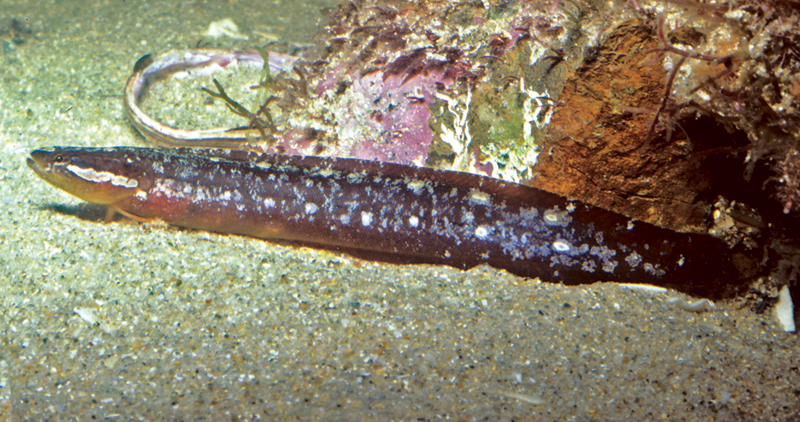Spotted Snake Blenny, Ophiclinops pardalis (McCulloch & Waite 1918)
Other Names: Spotted Snakeblenny, Spotted Snake-blenny

A Spotted Snake Blenny, Ophiclinops pardalis. Source: Rudie H. Kuiter / Aquatic Photographics. License: All rights reserved
Summary:
A pale brown snake blenny with faint brown mottling, a paler mid-dorsal stripe from the top of the head running along the dorsal-fin base, and a slightly broader and darker brown stripe immediately below from the rear edge of each eye, two or three dark stripes on the head from the posterior edge of each eye, the lower two stripes forming margins to broad pale mid-lateral stripe, and pale dorsal, anal and caudal fins mottled with brown.
Cite this page as:
Bray, D.J. 2019, Ophiclinops pardalis in Fishes of Australia, accessed 01 Jul 2025, https://fishesofaustralia.net.au/home/species/12
Spotted Snake Blenny, Ophiclinops pardalis (McCulloch & Waite 1918)
More Info
|
Distribution |
Endemic to South Australia, from Spencer Gulf to Ceduna. Inhabits inshore seagrass areas and macroalgae-covered reefs. Inhabits algal and seagrass leaf litter at the base of and amongst the roots of seagrass. |
|
Features |
Dorsal fin LII-LV, 1; Anal fin II, 38-41; Caudal fin 12-13; Pectoral fin 4-6; Pelvic fin I, 2. Body shallow (13-14% SL). Head small (18-19% SL); eyes small (14-15% HL); upper jaw length 24-25% HL). Single dorsal and anal fins with very elongate bases and fairly uniform heights, both broadly joined by membrane to caudal fin; dorsal arising slightly behind and above opercular edges; caudal fin pointed. Pectoral fins tiny, length less than eye diameter. |
|
Species Citation |
Ophiclinus pardalis McCulloch & Waite 1918, Records of the South Australian Museum (Adelaide) 1(1): 58, pl. 4(2). Type locality: Streaky Bay, South Australia. |
|
Author |
Bray, D.J. 2019 |
|
Resources |
Spotted Snake Blenny, Ophiclinops pardalis (McCulloch & Waite 1918)
References
George, A. & Springer, V.G. 1980. Revision of the clinid fish tribe Ophiclinini, including five new species, and definition of the family Clinidae. Smithsonian Contributions to Zoology 307: 1-31 figs 1-14 https://doi.org/10.5479/si.00810282.307 open access
Hoese, D.F., Gomon, M.F. & Rennis, D.S. 2008. Family Clinidae. pp. 696-722 in Gomon, M.F., Bray, D.J. & Kuiter, R.H. (eds). Fishes of Australia's Southern Coast. Sydney : Reed New Holland 928 pp.
Kuiter, R.H. 1996. Guide to Sea Fishes of Australia. A comprehensive reference for divers and fishermen. Sydney, NSW, Australia : New Holland Publishers xvii, 434 pp.
McCulloch, A.R. & Waite, E.R. 1918. Some new and little known fishes from South Australia. Records of the South Australian Museum (Adelaide) 1(1): 39-78 figs 26-31 pls 2-7 See ref at BHL
Rennis, D., Hoese, D.F. & Gomon, M.F. 1994. Family Clinidae. pp. 741-775, figs 650-684B in Gomon, M.F., Glover, C.J.M. & Kuiter, R.H. (eds). The Fishes of Australia's South Coast. Adelaide : State Printer 992 pp. 810 figs.
Thomson, J.M. 1978. A Field Guide to the Common Sea & Estuary Fishes of Non-tropical Australia. Sydney : Collins 144 pp.
Whitley, G.P. 1932. Studies in Ichthyology No. 6. Records of the Australian Museum 18(6): 321-348 figs 1-3 pls 36-39 DOI: 10.3853/j.0067-1975.18.1932.737 Open access
Williams, J.T., Holleman, W. & Clements, K.D. 2014. Ophiclinops pardalis. The IUCN Red List of Threatened Species 2014: e.T178923A1548286. http://dx.doi.org/10.2305/IUCN.UK.2014-3.RLTS.T178923A1548286.en. Downloaded on 03 June 2019.


